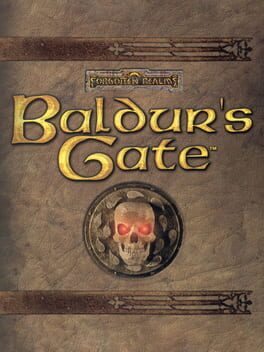Much has been said in recent years about the unwieldy influence of film on video games, critiques ranging from the length of Metal Gear Solid's cutscenes to the appendix gameplay of Naughty Dog's AAA ventures. Much less, if anything, has been said about the continued, in my opinion, smothering imposition of tabletop games on their digital siblings.
Baldur's Gate is a slog of a game. Companions appear and join at a whim in the midst of a perfunctory narrative about a chosen one burdened by a mysterious dark destiny whose surprises will not land in the slightest without preliminary knowledge of Forgotten Realms lore. Story, characters, twists: these are elements that will be improved in the landmark sequel, one that would establish BioWare as the preeminent voice in the Western RPG landscape. But the first Baldur's Gate's shortcomings aren't just absences to be filled in, but rather hollows that in a tabletop setting played by IRL friends with a passion for the setting, would have been more than adequately filled in. From this light, the emptiness of its story and characters are that much more understandable - that much more unforgivable. It is so clearly an inferior work, and almost makes sense the simplifying trajectory BioWare would take from BG2 onwards.
The sequel filled in the characters with pre-written depth and linearized the story, establishing a narrative territory becoming of video games. From here, BioWare and WRPGs at large would more and more molt their tabletop past, reaching its critical and commercial zenith in Mass Effect 2, a game defined almost solely by the charms of its pre-written companions and ease of gameplay. And though the third Mass Effect would murder that future, Baldur's Gate stands at the opposite end, a fossil that deserved the meteor. In the worst way possible, BG1 is an artifact not only of an extinct genre but a dead optimism: it made you believe video games were evolving.
Baldur's Gate is a slog of a game. Companions appear and join at a whim in the midst of a perfunctory narrative about a chosen one burdened by a mysterious dark destiny whose surprises will not land in the slightest without preliminary knowledge of Forgotten Realms lore. Story, characters, twists: these are elements that will be improved in the landmark sequel, one that would establish BioWare as the preeminent voice in the Western RPG landscape. But the first Baldur's Gate's shortcomings aren't just absences to be filled in, but rather hollows that in a tabletop setting played by IRL friends with a passion for the setting, would have been more than adequately filled in. From this light, the emptiness of its story and characters are that much more understandable - that much more unforgivable. It is so clearly an inferior work, and almost makes sense the simplifying trajectory BioWare would take from BG2 onwards.
The sequel filled in the characters with pre-written depth and linearized the story, establishing a narrative territory becoming of video games. From here, BioWare and WRPGs at large would more and more molt their tabletop past, reaching its critical and commercial zenith in Mass Effect 2, a game defined almost solely by the charms of its pre-written companions and ease of gameplay. And though the third Mass Effect would murder that future, Baldur's Gate stands at the opposite end, a fossil that deserved the meteor. In the worst way possible, BG1 is an artifact not only of an extinct genre but a dead optimism: it made you believe video games were evolving.
